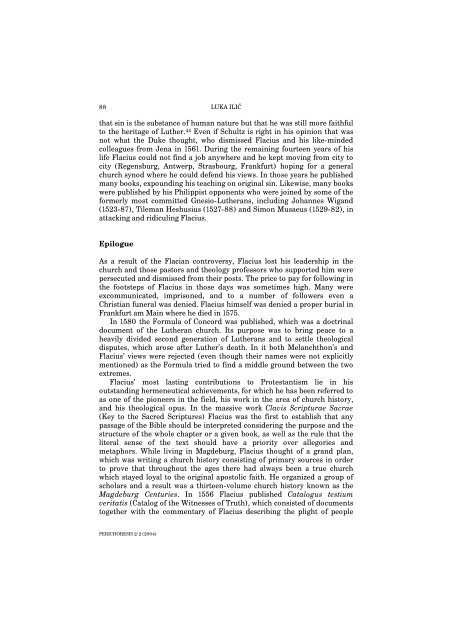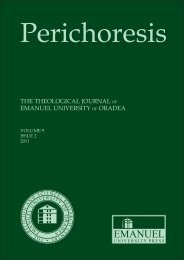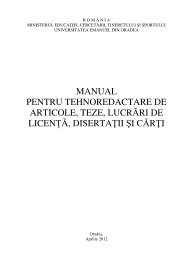Paradise Lost - Universitatea "Emanuel"
Paradise Lost - Universitatea "Emanuel"
Paradise Lost - Universitatea "Emanuel"
You also want an ePaper? Increase the reach of your titles
YUMPU automatically turns print PDFs into web optimized ePapers that Google loves.
88<br />
PERICHORESIS 2/2 (2004)<br />
LUKA ILIĆ<br />
that sin is the substance of human nature but that he was still more faithful<br />
to the heritage of Luther. 44 Even if Schultz is right in his opinion that was<br />
not what the Duke thought, who dismissed Flacius and his like-minded<br />
colleagues from Jena in 1561. During the remaining fourteen years of his<br />
life Flacius could not find a job anywhere and he kept moving from city to<br />
city (Regensburg, Antwerp, Strasbourg, Frankfurt) hoping for a general<br />
church synod where he could defend his views. In those years he published<br />
many books, expounding his teaching on original sin. Likewise, many books<br />
were published by his Philippist opponents who were joined by some of the<br />
formerly most committed Gnesio-Lutherans, including Johannes Wigand<br />
(1523-87), Tileman Heshusius (1527-88) and Simon Musaeus (1529-82), in<br />
attacking and ridiculing Flacius.<br />
Epilogue<br />
As a result of the Flacian controversy, Flacius lost his leadership in the<br />
church and those pastors and theology professors who supported him were<br />
persecuted and dismissed from their posts. The price to pay for following in<br />
the footsteps of Flacius in those days was sometimes high. Many were<br />
excommunicated, imprisoned, and to a number of followers even a<br />
Christian funeral was denied. Flacius himself was denied a proper burial in<br />
Frankfurt am Main where he died in 1575.<br />
In 1580 the Formula of Concord was published, which was a doctrinal<br />
document of the Lutheran church. Its purpose was to bring peace to a<br />
heavily divided second generation of Lutherans and to settle theological<br />
disputes, which arose after Luther’s death. In it both Melanchthon’s and<br />
Flacius’ views were rejected (even though their names were not explicitly<br />
mentioned) as the Formula tried to find a middle ground between the two<br />
extremes.<br />
Flacius’ most lasting contributions to Protestantism lie in his<br />
outstanding hermeneutical achievements, for which he has been referred to<br />
as one of the pioneers in the field, his work in the area of church history,<br />
and his theological opus. In the massive work Clavis Scripturae Sacrae<br />
(Key to the Sacred Scriptures) Flacius was the first to establish that any<br />
passage of the Bible should be interpreted considering the purpose and the<br />
structure of the whole chapter or a given book, as well as the rule that the<br />
literal sense of the text should have a priority over allegories and<br />
metaphors. While living in Magdeburg, Flacius thought of a grand plan,<br />
which was writing a church history consisting of primary sources in order<br />
to prove that throughout the ages there had always been a true church<br />
which stayed loyal to the original apostolic faith. He organized a group of<br />
scholars and a result was a thirteen-volume church history known as the<br />
Magdeburg Centuries. In 1556 Flacius published Catalogus testium<br />
veritatis (Catalog of the Witnesses of Truth), which consisted of documents<br />
together with the commentary of Flacius describing the plight of people




